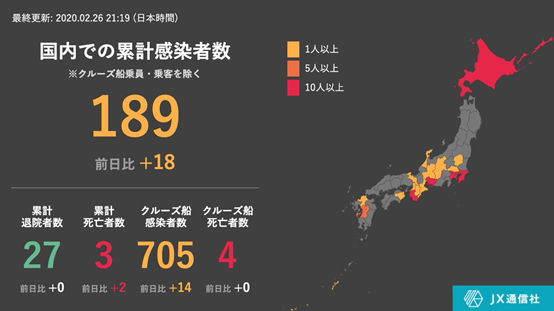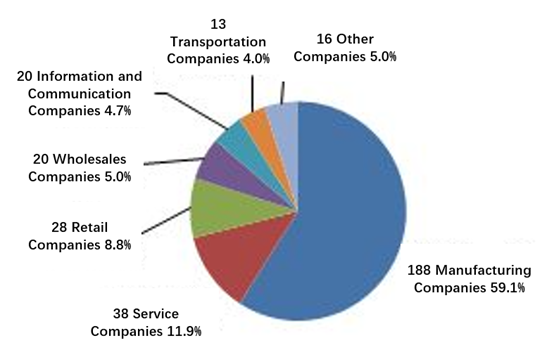Coronavirus Outbreak in Japan
Coronavirus Outbreak in Japan
The coronavirus disease (COVID-19) epidemic in Japan has been escalating since January 16, 2020 when the first case was diagnosed in the country. As of February 26, 2020, the number of infected cases has increased to 894, with 175 people having no recent travel history to other countries, 14 people returning from oversea and 705 people from the Princess Diamond Cruise Ship. The death toll of this epidemic has reached 7, with 4 people from the Princess Diamond Cruise Ship. In according to an article by the Centers for Disease Control (CDC) of United States, the COVID-19 has entered the "community transmission" stage in Japan.

(Picture from: JX News Agency)
The Japanese government categorized this disease as a "designated infectious disease" under the "Infectious Diseases Act" and all costs incurred for controlling this disease are borne entirely by the Japanese government.
The Ministry of Health, Labor and Welfare of Japan released a new pneumonia notice on February 22, 2020, suggesting that patients meeting the following symptoms or conditions should seek medical treatment:
· Cold symptoms or fever above 37.5 ° for four consecutive day
· Shortness of breath
· Elderly or sick people, and pregnant women
The people meeting the above listed symptoms should call the health center nearby, and determine whether to go to the nearby clinic for diagnostic testing. People without these listed symptoms could consult with family doctors or other medical services.
For more information, please visit the official website or scan the QR code of the Ministry of Health, Labor and Welfare of Japan as below.

(Picture from: Official Website of Ministry of Health, Labor and Welfare)
Suggestion for Businesses
Professor Mitsuo Kaku is an infectious disease expert from Northeast Medical University and he suggested the following tips for employees:
1. To prevent virus infections:
· Wash hands thoroughly
· Disinfection and ventilate workplaces properly
2. To control virus infections:
· Employees should report any COVID-19 symptoms immediately
· Employer should immediately alert within the company and start monitoring those who work closely with the employee(s) with reported symptoms, such as body temperatures, coughs etc.
· If an employee is diagnosed with COVID-19, all employees who work closely with him/her shall wear masks and disinfect their hands
Disease Control Policies
The Japanese Health Ministry issued a basic set of policies on handling COVID-19 infections to curb the spread of the disease on February 25, 2020 which includes the following suggestions:
· Employees with fever and/or coughs should stay at home;
· Employees should work from home;
· Suspend or cancel some public events when necessary; and
· Local governments can adopt different control measures based on local situations
The Japanese government also held a meeting for COVID-19 control on February 26, 2020, suggesting cancel or suspend all sports and other public events in the next two weeks. The experts who participated in the meeting advised that these measures in the next 1-2 weeks are critical to control the further spread of COVID-19 outbreak in Japan.
Impacts to Industries
Dentsu Group, a large advertising company, told its approximately 5,000 employees to work from home after one of its employees was diagnosed with COVID-19 infection on February 24, 2020. Panasonic Group had about 2,000 employees from its Tokyo office to work from home from February 27, 2020 through March 15, 2020. Shiseido Group also had 30% of its employees, approximately 8,000, work from home.
The infectious disease has impacted all industries in Japan. TOKYO SHOKO RESEARCH, LTD studied 318 listed companies on the impacts from the outbreak. Based on the public available data from 291 companies, 242 companies have been impacted, with manufacturing companies being the most affected.

(Picture from: TOKYO SHOKO RESEARCH, LTD)
The epidemic will continue causing significant impacts to most Japanese companies as import demand and domestic consumption remain low. As the number of Coronavirus cases continue to grow in Japan, it is impossible to predict when the epidemic would end and when its impacts to businesses start to subside.
